Scientific Publications
![]()
Our science is rooted in evidence-based, peer-reviewed research.
Read from our library.
Publications
![]()
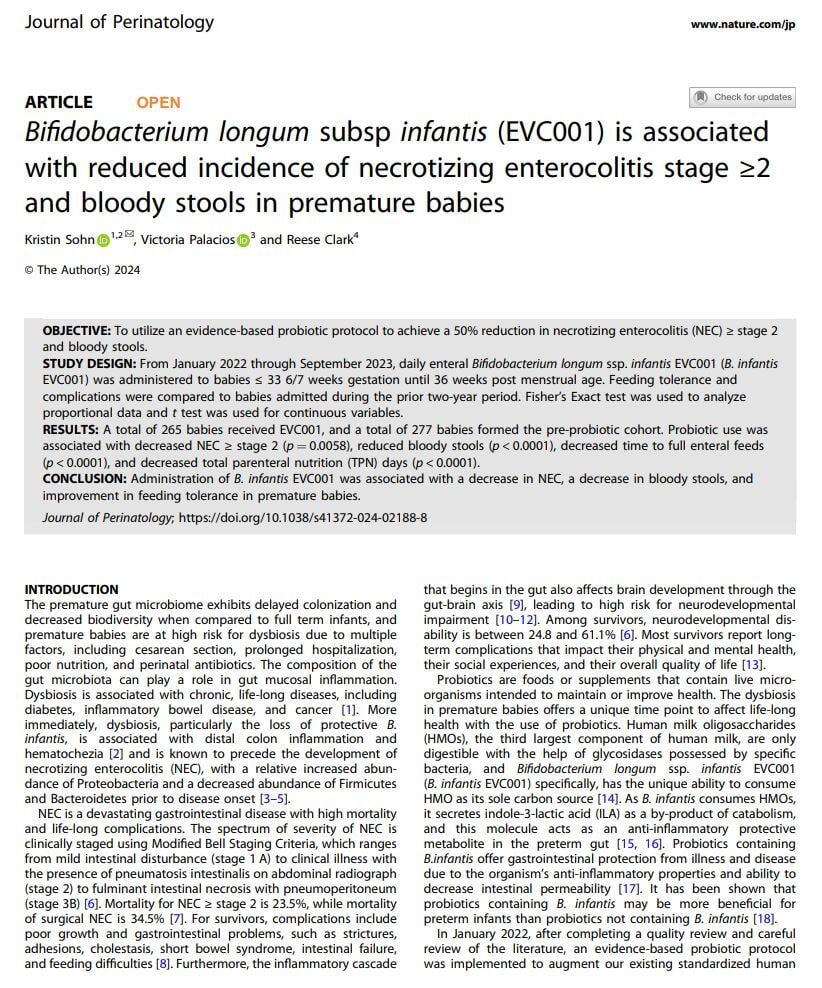
Sohn, K. et al. Bifidobacterium longum subsp infantis (EVC001) is associatedwith reduced incidence of necrotizing enterocolitis stage ≥2 and bloody stools in premature babies

Tobias, J. et al.
Bifidobacterium longum subsp. infantis EVC001 Administration Is Associated With a Significant Reduction In Incidence of Necrotizing Enterocolitis In Very Low Birth Weight Infants

Barratt, M. J. et al.
Bifidobacterium infantis treatment promotes weight gain in Bangladeshi infants with severe acute malnutirion

Bajorek, S. et al.
B. infantis EVC001 Is Well-Tolerated and Improves Human Milk Oligosaccharide Utilization in Preterm Infants in the Neonatal Intensive Care Unit

Larke, J. A. et al.
Preterm Infant Fecal Microbiota and Metabolite Profiles Are Modulated in a Probiotic Specific Manner

Casaburi, G. et al.
Metabolic model of necrotizing enterocolitis in the premature newborn gut resulting from enteric dysbiosis

Lueschow, S. R. et al.
Bifidobacterium longum subspecies infantis Strain EVC001 Decreases Neonatal Murine Necrotizing Enterocolitis
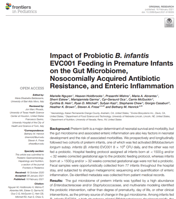
Nguyen, M. et al.
Impact of Probiotic B. infantis EVC001 Feeding in Premature Infants on the Gut Microbiome, Nosocomially Acquired Antibiotic Resistance, and Enteric Inflammation

Casaburi, G. et al.
Metagenomic insights of the infant microbiome community structure and function across multiple sites in the United States
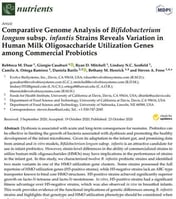
Duar, R. et al.
Comparative Genome Analysis of Bifidobacterium longum subsp. infantis Strains Reveals Variation in Human Milk Oligosaccharide Utilization Genes among Commercial Probiotics
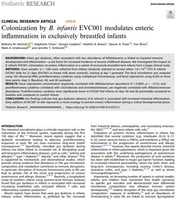
Henrick, B. et al.
Colonization by B. infantis EVC001 modulates enteric inflammation in exclusively breastfed infants
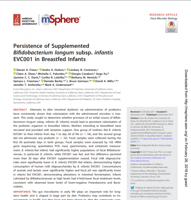
Frese, S. A. et al.
Persistence of Supplemented Bifidobacterium longum subsp. infantis EVC001 in Breastfed Infants

O'Brien, C. E. et al.
Early probiotic supplementation with B. infantis in breastfed infants leads to persistent colonization at 1 year
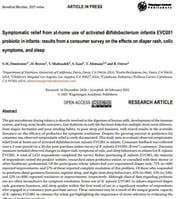
Dimitratos, S. M. et al.
Symptomatic relief from at-home use of activated Bifidobacterium infants EVC001 probiotic in infants:

Duar, R. et al.
Reintroducing B. infants to the cesarean-born neonate: an ecologically sound alternative to "vaginal seeding"

Duar, R. et al.
Colonization resistance in the infant gut: the role of B. infantis in reducing pH and preventing pathogen growth

Duar, R. et al.
Integrating the ecosystem services framework to define dysbiosis in the breastfed infant gut: The role of B. infantis and human milk oligosaccharides
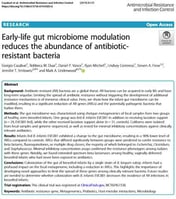
Casaburi, G. et al.
Early-life gut microbiome modulation reduces the abundance of antibiotic-resistant bacteria
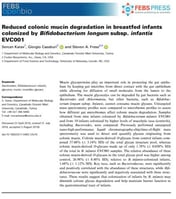
Karav, S. et al.
Reduced colonic mucin degradation in breastfed infants colonized by Bifidobacterium longum subsp. infantis EVC001

Casaburi, G. and Frese, S.
Colonization of breastfed infants by Bifidobacterium longum subsp. infantis EVC001 reduces virulence gene abundance

Henrick, B. M. et al.
Elevated fecal pH indicates a profound change in the breastfed infant gut microbiome due to a reduction of Bifidobacterium over the past century

Smilowitz, J. et al.
Safety and tolerability of Bifidobacterium longum subspecies infantis EVC001 supplementation in healthy term breastfed infants: a phase I clinical trial

Karav, S. et al.
N-glycans from human milk glycoproteins are selectively released by and infant gut symbiont in vivo
Disclaimer: INF108 is a drug candidate based on the learnings from EVC001. EVC001 is not approved or intended to prevent, treat, cure, or mitigate any disease. EVC001 is intended for healthy, full-term infants only.
Featured News Coverage
![]()
Our breakthrough findings on B. infantis EVC001 and its impacts on infant health have been addressed in notable publications around the world.

